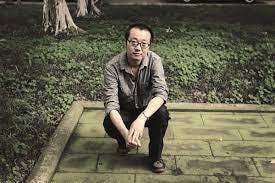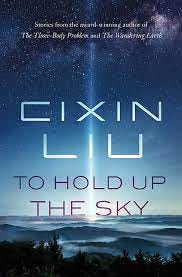“So now the Earth was a balloon, with the oceans and continents clinging to its inner surface.”
When you do a lot of book-recommending, you learn to recognize a kind of invisible door that closes in people when they’ve lost all interest in what you’re peddling. And you learn what words tend to precede this door-shutting, words like: short story collection; translated; science fiction (this one often inspires not so much a shutting as a slamming).
So when I encourage you to read a short story by one of China’s leading science fiction writers — when I tell you it does something to my reading mind that few if any pieces of literature have ever done — I’m aware that I’m speaking past a hastily bolted chain lock.
Hear me out:
One of literature’s jobs is to restore the freshness of truths that have grown limp and flavorless in the overcrowded fridge of our minds. For instance: the truth that we will one day die (Ivan Ilych). The truth that we inhabit bizarre and unwieldy meat-suits (Metamorphosis). The truth that we are, each of us, capable of monstrous acts (Crime and Punishment). We already know these things, in the sense that we could sign affidavits attesting to their validity, but we don’t, until we read literature, know them at a depth that leaves us staring dumb-struck at our bedroom ceilings.
Well, the truth that science fiction seeks to restores to crispness is one that you could read an entire shelf of classics without once encountering: that we live on a rock hurtling through unfathomable (and possibly inhabited) vastness, occupying a place of inconceivable insignificance in a cosmos of inconceivable complexity. This is true — it really is — and yet for most of us, most of the time, it feels approximately as astonishing as the multiplication tables. Yes, yes, My Very Excellent Mom Just Served Us Noodles, fine, we can look at one more picture of the Mars Rover, now go to bed.
Liu Cixin’s “Cloud of Poems” is one of the most potent restorers of this particular astonishment I’ve ever come across. (It’s rivaled by Liu’s own 1,500-page Three-Body Problem trilogy, but even I wouldn’t try wedging a slab like that through a closing door.)
Like much of Liu’s work, “Cloud of Poems” is almost unsummarizably strange. It’s set in the distant future, and it tells the story of a human, a dinosaur, and a creature of god-like technological advancement trying to settle the question of whether great poetry can be generated mechanically or if it requires a human soul.
For reasons that Liu makes seem both natural and inevitable, investigating this question turns out to require the extinguishing of the sun and the hollowing out of the Earth. So the human predicament has, thanks to this poetry contest, been turned upside down. Or perhaps inside out.
“Oh yes, humanity lived inside the Earth nowadays… The continents and oceans remained in their old places, only they had all migrated to the inside of the shell… So now the Earth was a balloon, with the oceans and continents clinging to its inner surface.”
It’s this last sentence in particular that gives me the shiver of cosmic awareness that is, for me, science fiction’s reason for being. Some of this has to do with the dizzying unfamiliarity of the scale. The oceans and continents, which usually register to us as inconceivably vast, are here reduced to near-scraps, like bits of melted cheese sticking to Saran Wrap. Just that word clinging, when applied to an object as large as, say, North America, causes a pleasant tickle in my nervous system.
But some of the image’s power has to do with its sheer oddity — that we should, that we even could, live inside a planet. So now the Earth was a balloon… There’s an obnoxious phrase, “tea towel fiction,” that’s used to describe writing in which the stakes are supposedly trivial, the settings crushingly domestic. Liu writes the opposite — he folds and tosses aside entire solar systems.
And in doing so he makes the actual circumstances of our existence (that we live on the surface, rather than the interior, of a planet; that we are entirely dependent on the warmth of a particular unremarkable star) feel as tenuous and arbitrary as they in fact are. He does not, you may have noticed, write elegant prose (at least not as it’s translated into English). He does not write characters of even the slightest depth. He appears to have no greater than an ordinary (perhaps even less than an ordinary) sensitivity to what we usually think of as the human condition. But that’s only because a central feature of the human condition is that we perpetually lose sight of the actual human condition. We are, at even our most exquisite and high-minded, the briefly-sentient detritus of stars. Liu won’t let you forget it.




Liu Cixin's work often has the flavor, if not necessarily the depth, of Latin American magical realism. Take this story for instance; it's designed to have a particularly surreal or folklorish quality to it, wherein the aliens / dinosaurs are deliberately absurd--the "God" decides to casually take on a human body, the dinosaurs seem almost comic, and the hero of the tale is a fool.
You can almost imagine this story with the identities of the characters swapped to a more fantasy and thus folklorish character; the dinosaur is a Mongol or Manchu (some conquering barbarian), the "god-type intelligence" is an immortal or nature spirit, and it'd still cohere to a large extent.
That, I think, is the charm of the story.
Love it as always! And you made me notice that without really thinking about it I've been recommending "This is How You Lose the Time War" by prefacing it with: "I don't usually seek out science fiction, but this..." It's too bad so many shy away from it, and especially disheartening, now that I think of it, since I'm trying to get people to read my science nonfiction. Imagine trying to recommend that!